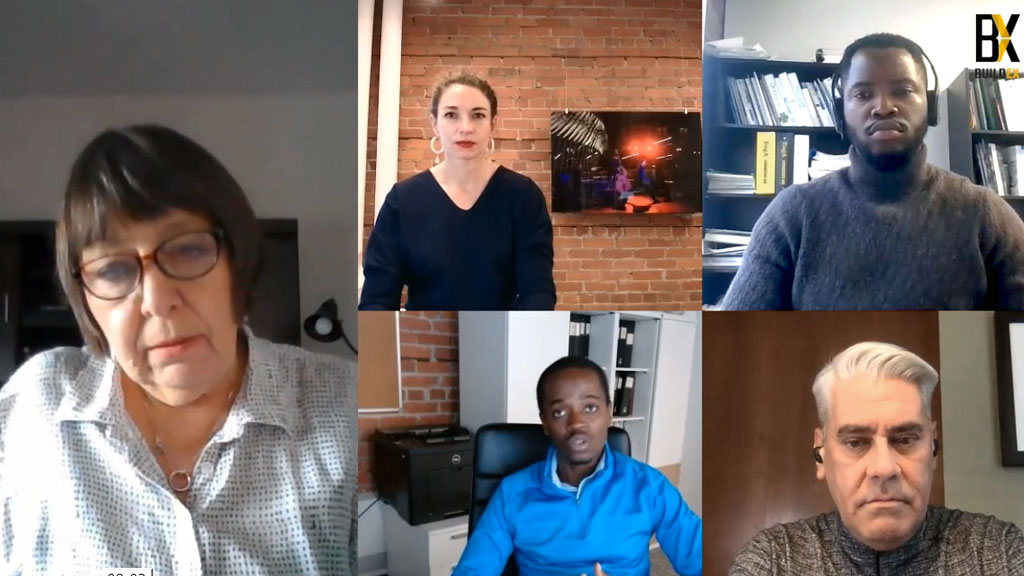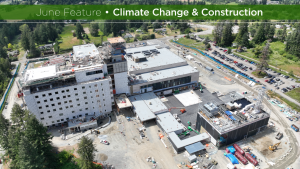The rise of racism awareness in Canada’s construction sector this year has prompted soul-searching, pointed conversations and shifts in attitudes from top to bottom, panellists addressing a Buildings Week audience said during presentations that were frank and at times personal.
In fact, said Lori Campbell, moderator of a Nov. 30 webinar billed as The Role of Leaders, Managers and Peers in Tackling Racism and Oppression, that is one of the big changes in business forged by the growth of Black Lives Matter following the killing of George Floyd in May.
“There used to be such a separation between the personal and professional,” said Campbell, principal at Alberta’s Colbourne Institute for Inclusive Leadership at Norquest College. “It used to be you never let anything personal come through the doorway of a workplace, but this is a completely different landscape now if we want to maximize our participation and our success.”
Panellist Kondwani Bwanali, a vice-president with Calgary Municipal Land Corporation, is a leader within the corporation but he notes the perception of him evaporates when he is out in public.
When #BLM started dominating public discourse, he began to have difficult conversations with his 17-year-old son and his seven-year-old twins. What happened to George Floyd was not right, they said.
“We talked about the perceptions of us in society versus the rest of the world and humankind,” said Bwanali, a native of Zimbabwe.
And then conversations started to happen at work. He was asked how he was feeling in the context of #BLM.
There is no longer an excuse not to have this conversation,
— Obi Ugo-Okeke
Williams Engineering Canada
“The biggest thing for me is that the dialogue was at least people making an effort to put themselves in someone else’s shoes or at least understand their experience,” Bwanali said.
Meanwhile, at Williams Engineering Canada in Edmonton, Naseem Bashir underwent similar introspection but he had additional responsibilities to find solutions, given his role as CEO.
He too recognized that serious conversations had to happen.
“The acceleration of COVID back in March really made it important to talk more to the company about what was on my mind and to share those thoughts,” said Bashir. “We are all so far apart from one another, working from home, and it was connecting more about bigger issues that we were going through on our own, not in the workplace per se.”
So he sent out an email to staff, saying it was time to take racism on.
“If we are not talking about it is still under the rug. It has to be full front and centre.”
Nigeria-born Obi Ugo-Okeke, an engineer in training with Williams Engineering, received the email with appreciation. Among his experiences living in Canada, he said, fearing he is not always understood in basic exchanges is sometimes a concern, so having company-wide conversations to bring everyone on staff together was a step in the right direction.
“There is no longer an excuse not to have this conversation,” Ugo-Okeke said. “It is very welcome, sharing experiences and learning, and once we are able to come together we can then move ahead and start tackling the issues of racism.”
The fourth panellist, Amber Osadan-Ullman, a colleague of Bwanali’s at Calgary Municipal Land Corporation where she works as senior development manager, also wanted to engage members of the corporation’s diverse workforce in dialogue. In 2020, she noted, a white person like her has to take a stand — it is not enough just to not be racist.
“You have to be anti-racist,” Osadan-Ullman declared.
What comes next, the panellists revealed, is these instances of personal and interpersonal enlightenment are incubating at the company level, with new practices and codes being set up leading in some cases to a radical overhaul of corporate values.
The coming changes could be as simple as rethinking corporate golf outings — in Zimbabwe, Bwanali noted, the sport is on the margins — and setting up diversity and inclusivity training, or as far-reaching as pondering how quickly leadership should be replaced and redefining what corporate success means.
As a company we have a lot to figure out, this is new for us,” said Bashir.
But benefits are bound to accrue on a team-building level, he explained. The firm can only gain from cutting waste, which is what racism is, he said.
“If we really want to perform, we need to have an awesome team where everybody is in,” said Bashir.
His firm is already solidly invested in sustainability and other values, Bashir said, but now will have to ensure diversity becomes integrated. The company has to carefully look at how it will change its leadership team over time, he said. Hiring diverse candidates to sit at the management table should lead to better decisions.
Bashir said eventually, discussions of social justice will end up touching upon the very roots of capitalism, which today tends to put profits ahead of everything else. That cannot continue, he said, noting that Williams was exploring the global Just Label social equity movement
In the end, Bwanali said, it should all come back to how comfortable all individuals feel, whether workplaces are “safe” environments.
“My hope is that in a year everything is safe,” he said.
Follow the author on Twitter @DonWall_DCN.











Recent Comments